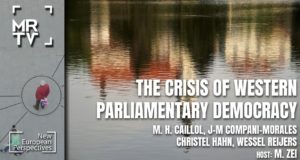As the debate rages over Manuel Barroso’s renewal at the head of the European Commission, everyone seems to forget that this year is also the 10th anniversary of Santer’s Commission collective resignation on grounds of ill-management and corruption scandals.
According to Newropeans, and to all those interested in the progress of both democracy and Europe, beyond the Barroso case, what is really important is to take stocks of the decade following this historical crisis of Europe’s executive administration. On these grounds should Barroso’s five year mandate be judged, as much as on the way he reacted to the crisis.
But in this field, the results are appalling. While many people – inside the Commission as well as from other European institutions and among the partners of many European projects and programmes – expected the 1999 crisis to kick off a wide-ranging process of renovation of the European executive administration, it is clear today that the situation has in fact worsened on every aspect.
Four challenges were highlighted by the 1999 crisis which should have been taken up successively by Romano Prodi’s and Manuel Barroso’s commissions in the past 10 years, i.e. :
1. the lack of political control over the European Commission’s top bureaucracy
2. the increasing tolerance, in the course of the 1990s, to corruption and fraud inside the institution
3. the growing influence of external players on the definition and implementation of the Commission’s policies and programmes
4. the loss of contact with field realities (citizens in general, operational partners or programme beneficiaries in particular).
Ten years later, the record is clear: not only has none of these four challenges been addressed, but the situation has deteriorated on every four aspects.
This conclusion is illustrated as follows:
1. In 1999, as I wrote at that time, something completely absurd for a so-called democratic system started to develop: “politicians” were resigning in order to cover « bureaucrats ». Santer’s Commission indeed committed suicide in order to prevent the launching of all-out investigations on the dealings of many general directors and other senior administrative officials directly involved in embezzlement, fraud and bad management practices. The two commissions that came after that never dared facing up to the Commission’s top administration and therefore let the system that caused the 1999 crisis prevail, a top administration free from any political control. In a meeting in 1998 with a group of young experts (vainly) trying to warn against the trends that led to the 1999 crisis, Commissioner Anita Gradin, then in charge of financial control, spontaneously replied to us that she could not do anything about general directors … she was just a Commissioner! Ten years and two commissions later, nothing has changed. The European Parliament will get excited about the nomination of Commissioners, when it should in fact exert its authority on the Commission’s top administration (for instance, putting an end to the life-long judicial immunity enjoyed by EU civil servants, as advocated in Newropeans’ programme).
2. Talking about these life-long judicial immunities, it is part of the second challenge that was never addressed in the past 10 years: tolerance to corruption and fraud inside the institution itself. The Commission remains a virtually uncontrolled institution: the OLAFs and other UCLAFs are run by the Commission, and the European Court of Auditors has very limited coercitive means; the Parliament is only interested in puppets (Commissioners, as Commissioner Verheugen confirmed in 2006) and the Council is only striving to submit and weaken the Commission (there is no hope of accountability on the part of States, which contributed actively to the general decay). No need to be a great expert to imagine what can be the result of years without control for an institution in charge of dozens of billions of Euros and with direct influence over whole segments of laws applying to 500 million people. In this regard too, nothing has changed in ten years. As a matter of fact, no civil servant was ever accused of anything relating to the 1999 crisis, or of anything at all since then: on the basis of this sole criterion, the Commission would be a perfect institution with an internal crime level equals to zero. Ten years later, this lie obviously remains the standard.
3. The influence of lobbies and the constant intrusion of external players involved in the management of EU programmes is no question. No one is fooled by the cosmetic procedures related to lobby transparency (this concerns the European Parliament too): lobbies can tell whatever they want, the way they want… a real programme of transparency and control!
4. Last but not least, if the Commission’s image was already deteriorated at the time of the 1999 crisis, it is today far worse as it has no image left whatsoever. The Commission has completely disappeared from European citizens’ political perception. It was completely overshadowed by the EU Council which did all it could to build on this trend. The nomination of mediocre presidents at the head of the institution has enabled Brussels’ technostructure to make its secret dream come true: remain in the shade, away from the problems being in the light brings about (as it nearly happened in 1999). As regards operational partners, in particular the myriad of EU programme beneficiaries (universities, associations, SMEs, local authorities,…), the Commission managed to decimate their numbers (as shown by the decreased attendance at Erasmus) and drive away many of them, especially the most dynamic. One of the instruments of this brilliant achievement was precisely the way the European top administration diverted away the « post 1999-crisis effect ». Far from reinforcing internal controls, the Commission was quick to multiply bureaucratic constraints on small beneficiaries of EU funds: inflation of red tape, omnipotence of an ill-equipped financial control offices, endless procedures… all these decisions literally destroyed much of the hotbed of trans-European civil society beginning to emerge at the end of the 1990s, drove away towards other funding sources the most dynamic players, and on the contrary let the field open to operators with good administrative infrastructures, no necessarily good projects – or any project at all. But this matters little to the Commission. One of my colleagues while I was working in Luxembourg at the European Court of Auditors once told me: “For Brussels, what matters is not the project, its quality of utility, but if its financial record is properly filled in ». With such historic ambition, no wonder why EU programme beneficiaries progressively turned into one of the most critical group on the Commission and its operating methods… instead of logically becoming a faithful support. In fact this sums up the state of the Commission’s political legitimacy today: none!
Ten years after the Commission’s big crisis, the fact remains that none of the profound causes that led to the collective resignation of the European executive power was addressed, the situation in fact deteriorated even further, creating the conditions of growing isolation for the Commission, now completely disconnected from socio-political realities (even a control is a link to reality) and merely concerned about the power and privileges of its top administration.
If the next Commission stood a chance to have a politically accountable programme, it would consist of addressing these four challenges. We know already that Manuel Barroso won’t. But we should have no illusion in any case: given that member-states are responsible for this choice and are short-sighted enough to estimate that it is in their interest to have a weak Commission and president, no other candidate will make any difference, as we have seen in the past ten years that the Commission cannot be renovated from the inside.
The only solution for all those, among whom I am, who know that a democratic European Union needs a legitimate and dynamic European executive power in order to face the common challenges related to the social and economic crisis, the weather crisis, the global governance crisis… is to work on both European and national levels, inside and outside of the European institutions, enabling each and everyone to contribute to the preparation of a radical change in 2014 in the structure and designation means of the European executive power, in the control of how it operates and of its top hierarchy, and in the definition of five-year priorities for the EU.
A large programme, one may say… but do we really have a choice unless we sacrifice either Europe or democracy, most probably both at the same time?


 LEAP2040 Toutes les informations et archives Europe2040
LEAP2040 Toutes les informations et archives Europe2040


